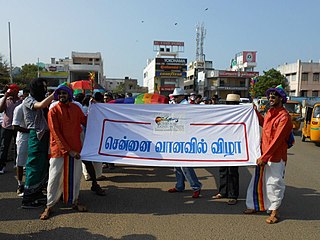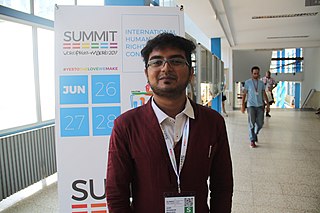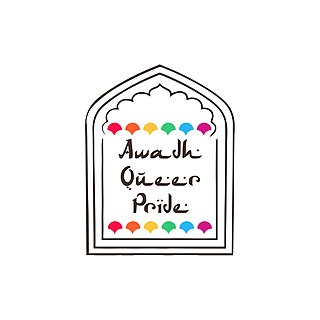Homosexuality in India is socially permitted by most of the traditional native philosophies of the nation, and legal rights continue to be advanced in mainstream politics and regional politics. Homosexual cohabitation is also legally permitted and comes with some legal protections and rights.

Lesbian, gay, bisexual, transgender, and queer (LGBTQ) rights in India have expanded in the 21st century, though much of India's advancements on LGBT rights have come from the judiciary and not the legislature. LGBTQ people in India continue to face legal and social challenges not experienced by non-LGBTQ people. There are no legal restrictions against gay sex within India. Same-sex couples have some limited cohabitation rights, colloquially known as live-in relationships. However, India does not currently provide for common-law marriage, same-sex marriage, civil union or unregistered cohabitation.

Lesbian, gay, bisexual and transgender (LGBT) rights in Tamil Nadu are the most progressive among all states of India. Tamil Nadu was the first state in India to introduce a transgender welfare policy, wherein transgender individuals can access free gender affirmation surgery in government hospitals and various other benefits and rights. The state was also the first to ban forced sex-selective surgeries on intersex infants, and also the first state to include an amendment in its state police guidelines that expects officers to abstain from harassing the LGBTQIA+ community and its members. The state also became the first to ban conversion therapy as well as the first to introduce LGBTQIA+ issues in school curricula.

India has a long and ancient tradition of culture associated with the LGBTQ community, with many aspects that differ markedly from modern liberal western culture.
Queer Azaadi Mumbai Pride March, also called Queer Azaadi March and Mumbai pride march, is an annual LGBTQIA pride parade that is held in the city of Mumbai, capital of Maharashtra, India. It usually begins from Gowalia Tank ending at Girgaum Chowpatty. It, along with the Pride Week, is organized by Queer Azaadi Mumbai, a collective of organizations and individuals working for the rights of LGBTQIA community. The participants of the march include people from the LGBTQIH community as well their "straight allies", from India and outside. In addition to being a celebration of queer pride, the pride march and related events are a platform to ask for equal rights.

Delhi Queer Pride Parade is organised by members of the Delhi Queer Pride Committee every last Sunday of November since 2008. The queer pride parade is a yearly festival to honour and celebrate lesbian, gay, bisexual and transgender people, and their supporters. The parade usually runs from Barakhamba Road to Tolstoy Marg to Jantar Mantar.
This is a timeline of notable events in the history of non-heterosexual conforming people of South Asian ancestry, who may identify as LGBTIQGNC, men who have sex with men, or related culturally-specific identities such as Hijra, Aravani, Thirunangaigal, Khwajasara, Kothi, Thirunambigal, Jogappa, Jogatha, or Shiva Shakti. The recorded history traces back at least two millennia.
Chennai has LGBTQIA cultures that are diverse concerning- socio-economic class, gender, and degree of visibility and politicisation. They have historically existed in the margins and surfaced primarily in contexts such as transgender activism and HIV prevention initiatives for men having sex with men (MSM) and trans women (TG).
Hyderabad is a conservative city when it comes to LGBT rights, compared to other Indian Metros. But since it slowly started becoming the second IT-capital after Bangalore, there has been a continuous influx of people of all cultures from across India. In the past few years, there has been some increase in LGBT activism in Hyderabad, including pride marches of 2013 and 2014. Slowly, Top MNCs have been introducing LGBT friendly policies in their Hyderabad offices.
XUKIA is a queer collective based in Assam, India that works for LGBT issues in the region. It is one of the first Queer Collectives to come up in the North East India.

The Chennai Rainbow Pride March has been held by members of Tamil Nadu LGBTIQA+ communities every June since 2009. The pride march is organised under the banner Tamil Nadu Rainbow Coalition, which is a collective of LGBT individuals, supporters, and organizations working on human rights and healthcare for the LGBTQIA community. The Pride March occurs on the final Sunday of June every year. The Pride March is usually preceded by a month-long series of events organized by NGOs and organizations to inculcate awareness and support for the LGBTQ community, such as panel discussions, film screenings, and cultural performances. The Chennai Vaanavil Suyamariyadhai Perani a.k.a. Chennai Rainbow Self-Respect March is known for being inter-sectional in nature as it addresses issues with multiple axes such as caste, class, religion coupled with gender discrimination.

Lesbian, gay, bisexual and transgender (LGBT) people in Kerala face legal and social difficulties not experienced by non-LGBT persons. However, Kerala has been at the forefront of LGBT issues in India after Tamil Nadu. It became one of the first states in India to establish a welfare policy for the transgender community and in 2016, proposed implementing free gender affirmation surgery through government hospitals. Same-sex sexual activity has been legal since 2018, following the Supreme Court ruling in Navtej Singh Johar v. Union of India. In addition, numerous LGBT-related events have been held across Kerala, including in Kochi and Thiruvananthapuram. However, there is also increasing opposition to LGBT rights recently as evidenced by the anti-LGBT campaigns spearheaded by meninist groups and Muslim organisations like Indian Union Muslim League, Samastha and Jamaat-e-Islami.

Gopi Shankar Madurai is an Indian equal rights and Indigenous rights activist. Shankar was one of the youngest, and the first openly intersex and genderqueer statutory authority and one of the candidates to contest in 2016 Tamil Nadu Legislative Assembly election. Shankar is also the founder of Srishti Madurai Student Volunteer Collective. Shankar's work inspired the Madras High Court to direct the Government of Tamil Nadu to order a ban on forced sex-selective surgeries on intersex infants. In December 2017, Shankar was elected to the executive board of ILGA Asia. In August 2020, the Ministry of Social Justice and Empowerment appointed Shankar as the South Regional representative in the National Council for Transgender Persons.Shankar introduced the "others" option in the sex column of application forms for political parties and central universities, including Jawaharlal Nehru University. Shankar was also instrumental in granting civil rights for transgender persons, including pilot licenses for transmen and property inheritance rights for transwomen. Additionally, the Juvenile Justice Committee and POCSO Committee seek Shankar’s advice on issues related to the infancy and childhood of infants and children born with diverse sex characteristics.

Awadh Queer Pride is an annual event held in Lucknow, India. It was first held on 9 April 2017, and in the years since has also been held in February and March. It is organized by the Awadh Queer Pride Committee (AQPC), which is made up of volunteers.
Hyderabad Queer Pride has been celebrated on one of the Sundays in February since 2013. First held on 3 February 2013, Hyderabad became the 12th Indian city to join the queer pride march bandwagon, fourteen years after the first Indian pride march was held in Kolkata. In 2015 it was renamed as Hyderabad Queer Swabhimana Pride, emphasising the self-respect and the acceptance of the community of themselves, as they are. In 2016 it was altered to Hyderabad Queer Swabhimana Yatra and has been retained since.
Chennai International Queer Film Festival is a three-day LGBT- event that usually takes places on the last weekend of July as a part of the city's pride events. The main organizers are SAATHII and Orinam in partnership with Goethe-Institut, Chennai. The other volunteers include various community groups and NGOs, including Nirangal, East-West Center for Counselling, and RIOV. The last day is usually performances along with a panel discussion, usually to discuss and bring out the challenges faced by community members.
Tamil sexual minorities are Tamil people who do not conform to heterosexual gender norms. They may identify as LGBTQIA. It has been estimated that India has a population of 2.5 million homosexuals, though not all of them are Tamil, and not all Tamils live in India.
The following list is a partially completed compilation of events considered to have a profound effect on the welfare or image of Tamil sexual minorities. The use of bold typeface indicates that the event is widely considered to be landmark:

Queer Chennai Chronicles, also known as QCC is an Indian LGBT literary organization that aims to promote lesbian, gay, bisexual, transgender and queer literature through programs that encourage development of aspiring writers and through annual Queer LitFest, Chennai.
Malini Jeevarathnam is an Indian documentary film director, who primarily works in Tamil Nadu. They are known for their acting and documentary work on LGBTQ+ issues.









